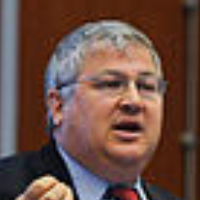Obama Justice Dept. Releases George W. Bush’s Legal Justification for Warrantless Surveillance with Key Sections Still Censored
 Jack Goldsmith (photo: Wikipedia)
Jack Goldsmith (photo: Wikipedia)
The Justice Department released the George W. Bush Administration’s legal justification for a wide-ranging wiretap program that was begun in the aftermath of the 9/11 attacks.
The documents, released with minimum fanfare late Friday, were the reasoning behind Bush’s Stellar Wind program, which allowed the administration to listen in on phone conversations in which at least one end of the conversation involved a suspected member of al-Qaeda or an al-Qaeda affiliate and at least one end of the conversation was outside the United States, according to The New York Times.
However, as is so often the case with late Friday news releases, there is more to the story than meets the eye. Although the move by the Obama administration appears to be a positive step towards transparency, crucial sections of the memos remain censored.
At issue is the fact that the program actually went beyond monitoring foreign conversations and included the bulk collection of emails from Americans with no connection to terrorism. In fact, the Justice Department concluded that aspects of the program were illegal.
In March 2004, as then-Attorney General John Ashcroft lay in a hospital bed recovering from gallbladder surgery, White House counsel Alberto Gonzales and Chief of Staff Andrew Card tried to convince Ashcroft to renew the administration’s secret surveillance program which had just been deemed illegal by the Ashcroft’s legal advisors. Ashcroft’s top assistant, James Comey, rushed to the hospital to stop Gonzales and Card from trying to manipulate the seriously ill Ashcroft into continuing the program.
According to his testimony before Congress, Comey said he alerted FBI Director Robert S. Mueller III about the plan and raced, sirens blaring, to join Ashcroft in his hospital room, arriving minutes before Gonzales and Card. Ashcroft refused to sign the papers they had brought. The entire leadership of the Justice Department then threatened to resign.
Jack Goldsmith, who ran Bush’s Office of Legal Counsel, had previously agreed that the program was illegal. But on May 6, 2004, he reversed his position and completed a 108-page memo that argued that the Authorization for Use of Military Force, passed by Congress in 2001, provided all the cover the administration needed for the wiretap program.
“We conclude only that when the Nation has been thrust into an armed conflict by a foreign attack on the United States and the President determines in his role as Commander in Chief and sole organ for the Nation in foreign affairs that it is essential for defense against a further foreign attack to use the signals intelligence capabilities of the Department of Defense within the United States, he has inherent constitutional authority to direct electronic surveillance without a warrant to intercept the suspected communications of the enemy—an authority that Congress cannot curtail,” Goldsmith wrote in the memo.
The second memo, (pdf) dated July 16, 2004, even conjured up the memory of the first U.S. president to justify wiretapping. “The United States, moreover, has a long history of surveilling its enemies—a history that can be traced to George Washington who ‘was a master of military espionage,’ and ‘made frequent and effective uses of secret intelligence in the second half of the eighteenth century,’ ” Goldsmith quoted in that memo.
The Times revealed the existence of the program in December 2005. The wiretapping came under the control of the FISA court in 2007 and we now know it as Section 702 of the FISA Act.
The ACLU obtained the release of the documents under the Freedom of Information Act. “Their conclusions are deeply disturbing,” Patrick Toomey, staff attorney for the American Civil Liberties Union, told The Times. “They suggest that the president’s power to monitor the communications of Americans is virtually unlimited—by the Constitution, or by Congress—when it comes to foreign intelligence.”
-Steve Straehley, David Wallechinsky
To Learn More:
Legal Memos Released On Bush-Era Justification For Warrantless Wiretapping (by Ellen Nakashima, New York Times)
Redactions in U.S. Memo Leave Doubts on Data Surveillance Program (by Charlie Savage, New York Times)
Obama Refuses to Release Bush’s Legal Excuse for Illegal Surveillance (by Noel Brinkerhoff, AllGov)
Bush Illegal Wiretapping Program Almost Prompted FBI and Justice Resignations (by Noel Brinkerhoff, AllGov)
- Top Stories
- Unusual News
- Where is the Money Going?
- Controversies
- U.S. and the World
- Appointments and Resignations
- Latest News
- Trump to Stop Deportations If…
- Trump Denounces World Series
- What If China Invaded the United States?
- Donald Trump Has a Mental Health Problem and It Has a Name
- Trump Goes on Renaming Frenzy






Comments